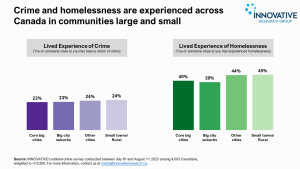

As we approach the end of 2023, INNOVATIVE is releasing several important polls conducted earlier this year but not yet released publicly. Housing, crime, and homelessness have been growing as pressing concerns for Canadians. Some see these issues as primarily affecting large urban centres. A July survey by INNOVATIVE shows that these issues are experienced across Canada in communities large and small. In this blog post, we delve into the key findings, exploring the dynamics that shape public opinion across the country.
The online poll of 4,003 Canadians was conducted in July by Innovative Research Group. The results are weighted to 2,500 by age, gender, region, and federal party identification to reflect the actual population according to Census data. A detailed methodology is provided in the report.
Affordable housing takes center stage
3-in-5 (60%) Canadians identify affordable housing as one of the most important issues facing the nation, more so than crime and homelessness. For 16%, it stands as the single most important concern. Not surprisingly, young Canadians, in general, and young British Columbians, in particular, as well as residents in Canada’s three largest cities are the most concerned. However, the issue ranks highly among all ages and places, although Atlantic Canada is less concerned than elsewhere.
Cross-party support for interventionist housing policies
The survey tested four fairly interventionist housing policies that are frequently in the news. Despite political differences, a common ground emerges in the realm of housing policies. The majority of supporters from every political party support measures such as:
- Building more affordable/social housing
- Prohibiting foreign home-buyers
- Relaxing local regulations for housing construction
- Implementing the Vacant Home Tax
NDP partisans, in particular, support more affordable/social housing units and the Vacant Home Tax.
Safety concerns vary across demographics
While there are bigger differences across demographics in crime than in housing, these differences are not related to community size. In fact, people outside of major cities are more likely to know someone who is a victim of crime or be one themselves.
While only 1-in-10 Canadians feel unsafe in their communities, the key differences are across regions, not between urban and rural settings. Canadians living in Québec and the Atlantic provinces are much less likely to feel unsafe compared to other regions. Political affiliations also play a role, with Liberals feeling twice as safe as Conservatives. Conservatives, in turn, are most likely to consider crime as a critical national issue.
Alberta’s approach to treating addiction
More than half (55%) of Canadians express support for Alberta’s involuntary treatment approach to addiction. Those close to someone who has experienced homelessness are more likely to endorse this strategy. However, individuals who have experienced homelessness themselves are more divided. While a majority (51%) of those who have experienced homelessness support involuntary treatment, a third do not, with 21% stating it is a very bad idea.
Summing it up
As we navigate the complex Canadian socioeconomic landscape, it becomes evident that affordable housing, safety concerns, and political affiliations are interconnected elements shaping public opinion. These findings underscore the need for comprehensive, region-specific policies that address the diverse challenges faced by Canadians.




































